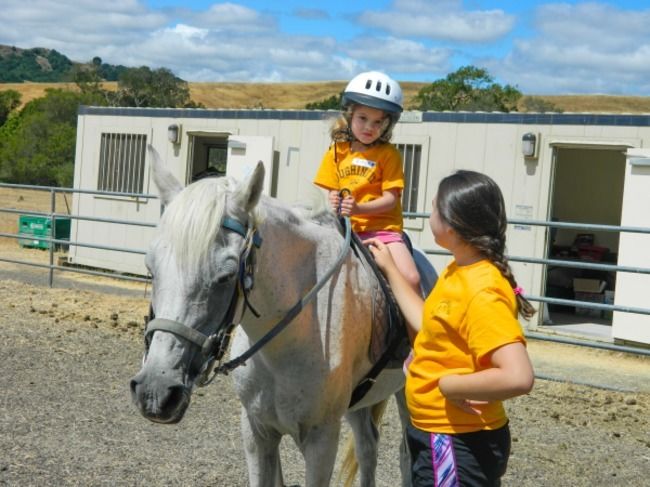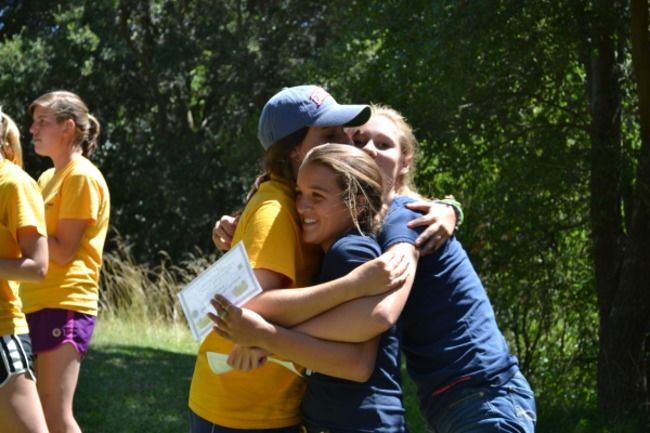Halloween may be fun, dressing up in costumes and eating lots of candy, but it can also be one of the scariest times of the year for children. All of the scary things around can remind us that new experiences can be fun, exciting and terrifying to children all at the same time. Learning how to overcome fears and experience new things are skills that all children need and can best be learned in a supportive environment like camp. As psychologist Michael Ungar points out in his article “Summer Camps Make Kids Resilient“, “summer camps are places where children get the experiences they need to bolster their range of coping strategies.” At camp, children are exposed to a different environment and encouraged to try new things that may seem scary to them at first. They learn how to take safe risks and learn how to be resilient in the face of new situations.

Sometimes campers might feel a little too stressed by a new challenge. Whenever that happens, camps use these three main tactics to help hesitant campers feel more comfortable. Parents could easily adapt these to use at home.
- Talk it through: Most counselors will talk through an activity or event with their whole camper group before the new activity or event begins. Counselors will share what will happen, the time it will take, and the expectations that will fall onto the camper group. If there is a camper who is still reluctant to try the new activity the counselor can then focus on that child and work through verbally what the issue may be. Often a child won’t know what is bothering him, or won’t be able to put it into words easily. A counselor or parent can help with some of the guess-work as they work with the child to root out the problem. The Camper may say they don’t want to play soccer without their hat because they will get hot. A counselor will retrieve the hat, but the child is still reluctant to play. The Counselor can then see that the hat is not the issue, but there is something deeper going on. The Counselor can then ask a more probing question about how the camper is feeling about the new soccer activity. Perhaps the child is feeling nervous, as they have never played soccer before, or perhaps they are worried they won’t be good at the sport because they tried it once and they didn’t score a goal. Once the Counselor or the parent knows what the true reason is a child is reluctant to participate they can work through the problem more easily.
- Role Model It: The best way to encourage a child who is nervous about taking healthy risks is to take healthy risks yourself. A counselor may demonstrate an activity, or may share how they felt the first time when they tried something and share how they overcame their fear of trying the new activity. The more a child sees the adults in their lives confront new situations and work through the emotions and feelings they are having about them, the more likely the child will feel comfortable trying new things in their own lives.
- Positive Encouragement: Counselors are skilled at providing just the right amount of pressure that will encourage a hesitant child to try something new. Sometimes a child just needs to hear that someone else believe in them and believe that they can accomplish the situation at hand. Parents can assist their children in new situations by letting them know that they know their child will enjoy the new experience because of the research the parent did, or the feedback they received from another trusted adult.
No matter what the situation may be, camps help children to take on new challenges and new situations that will benefit children in the later years of their lives. The more capable and comfortable they are interacting with new situations as children will build in cumulative experience and help them feel the same level of comfort in new situations and experiences as adults.
Often activities that are new to campers are offered multiple times during a camp session. Providing multiple opportunities for a child to learn and ease into a new experience. This makes it easier for a child to build the courage to try out the new situation and handle it with confidence.
Just like Halloween, real life fears and new experiences can seem scary at first, but by using the right tactics, children can overcome these challenges and become resilient to new situations. Camp can be a great way to teach children these tactics and provide them with a supportive environment to help them practice overcoming new things, preparing them for scary experiences in real life.




